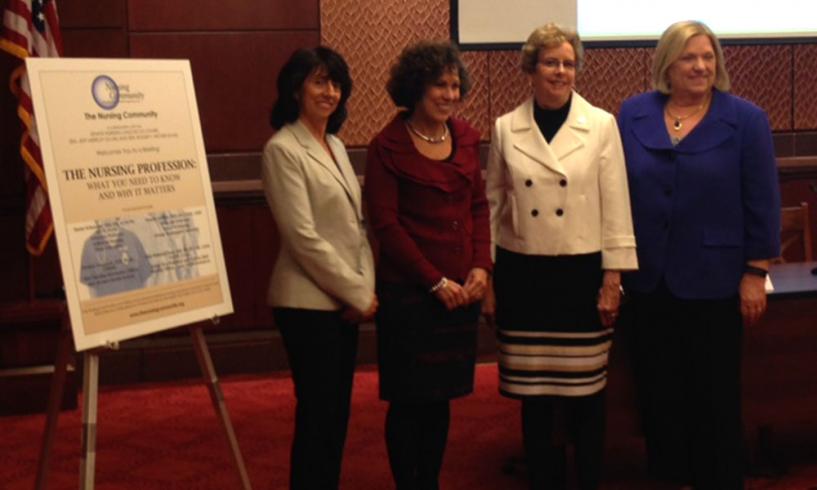As one of the largest professions in the United States, nursing encompasses many different avenues of study and patient care. From bedside to research to education and beyond, this workforce accounts for more than 3 million RNs. On March 15, ONS president-elect, Susan Schneider, PhD, RN, AOCN®, FAAN, presented at the Nursing Community Senate Caucus in Washington, DC. The caucus provided nursing advocates a forum to relay the importance of the field of nursing to senators.
“The presenters provided senators and their staff with information regarding the nursing workforce, types of nursing roles, where nurses work and how they are educated,” Schneider said. “One speaker highlighted the role of advanced practice nurses in their organization and another discussed the advantages and challenges of electronic medical records from a nursing perspective.”
Schneider’s presentation was “Nursing 101: An Overview of the Nursing Profession,” encompassing the roles of RNs throughout hospitals, outpatient centers, and in other healthcare settings. Her presentation illustrated the varied duties and responsibilities of RNs during a single shift. As an example, she focused on a single shift in a bone marrow transplant unit. Between administering IV medications and coordinating with a patient’s dietician, after she had educated the patient’s spouse of new developments and before she prepared to transition to the nurse for the following shift, she found time to facilitate a live video chat with a patient and his children. Schneider showed the immense range of care that nurses offer to patients within the confines of a single shift.
“This was an excellent opportunity to highlight the important contributions of nurses to our nation’s health care and to educate the senate staff regarding how nurses can be resources to them and their constituents,” Schneider said. “The goal of this session was for the Nursing Community group to revitalize the nursing senate caucus by proving information about the education, workforce and practice of registered nurses.”
Schneider also discussed the roles of nurse researchers in developing and progressing quality patient care. She provided her work in symptom management as just one of many examples of nurse research. Schneider also covered the understated importance of nurse educators, as new and important material is discovered and disseminated throughout the field. In closing, Schneider reminded the caucus that in Gallup polls, nurses rate among the highest professions in honesty and ethical standards. She also noted that one in every 45 voters is a nurse, and many work to advocate for their profession and their field.
ONS and its representatives continue to work for change in oncology. Whether that’s in the laboratory, at the side of a patient’s bed or chair, or in meeting rooms on Capitol Hill, ONS advocates for oncology nurses throughout the country.






